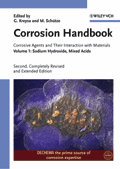Kreysa, Gerhard / Schütze, Michael (ed.)
Corrosion Handbook - Corrosive Agents and Their Interaction with Materials
Volume 1: Sodium Hydroxide, Mixed Acids
|

|
2., completely revised and enlarged edition - June 2004
380,- Euro / 562,- SFR
2004. 466 Pages, Hardcover
- Handbook/Reference Book -
ISBN 3-527-31117-3 |
The DECHEMA Corrosion Handbook provides a comprehensive collection of knowledge which is unique both in scope as well as content. Corrosion data and the chemical resistance of all technically important metallic, non-metallic, inorganic and organic materials in contact with aggressive media are covered, constituting the prime information source worldwide for the selection of materials for equipment in which corrosive media are handled or processed. Furthermore, methods of corrosion protection and prevention are also described.
Faced with the task of optimizing a given environment-material system, the user of this work will find answers to the following questions:
- Is there information available on the behavior of the material under consideration in a particular medium?
- Which materials are out of question for the proposed purpose?
- Which materials can be used without hesitation in the medium concerned?
- What are the conditions under which a less resistant, less costly material will give satisfactory service?
- Which material offers best performance for value under the given circumstances?
- What protective measures exist: inhibitors, coatings, cathodic protection, etc.?
The influence of sodium hydroxide on some 450 materials and the effect of mixed acids on some 700 constitute the contents of this first volume. Unrivaled in the research and evaluation of the international pertinent literature, more than 600 references to primary sources, 200 figures and 250 tables arranged by agents/environment represent the most detailed corrosion data available.
Aus dem Inhalt / From the Contents:
PART I: SODIUM HYDROXIDE
METALLIC MATERIALS
Aluminum and Aluminum Alloys
Copper and Copper Alloys
Iron, Iron-based Alloys and Steels
Nickel and Nickel Alloys
Titanium and Titanium Alloys
Cadmium and their Alloys
NON-METALLIC INORGANIC MATERIALS
Carbon and Graphite
Binders for Building Materials
Glass
Quartz Ware and Quartz Glass
Enamel
Oxide Ceramic Materials
Metal Ceramic Materials
ORGANIC MATETRIALS/ PLASTICS
Thermoplastics
Thermosetting Plastics
Elastomers
Duroplasts
MATERIALS WITH SPECIAL PROPERTIES
Coatings and Linings
Seals and Packings
Composite Materials
MATERIALS RECOMMENDATIONS
PART II: MIXED ACIDS
METALLIC MATERIALS
Aluminum and Aluminum Alloys
Copper and Copper Alloys
Iron, Iron-based Alloys and Steels
Nickel and Nickel Alloys
Titanium and Titanium Alloys
Zinc
Cadmium and their Alloys
NON-METALLIC INORGANIC MATERIALS
Carbon and Graphite
Binders for Building Materials
Glass
Quartz Ware and Quartz Glass
Enamel
Oxide Ceramic Materials
Metal Ceramic Materials
ORGANIC MATETRIALS/ PLASTICS
Thermoplastics
Thermosetting Plastics
Elastomers
Duroplasts
MATERIALS WITH SPECIAL PROPERTIES
Coatings and Linings
Seals and Packings
Composite Materials
MATERIALS RECOMMENDATIONS
Für weitere Informationen wenden Sie sich bitte an die DECHEMA e.V.,Herrn Dr. Roman Bender unter Tel. 0049-(0)69-7564-278 .
For more information please contact DECHEMA e.V., Dr. Roman Bender by phone no.: 0049-(0)69-7564-278

